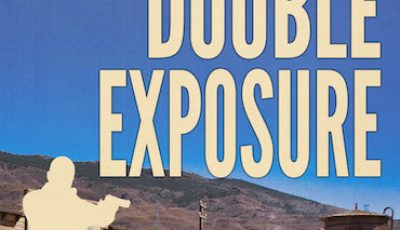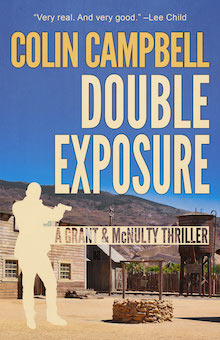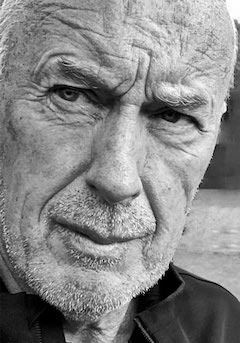

Crime Fiction Double Exposure: A Grant and McNulty Thriller by Colin Campbell
 “You do know this whole cops and donuts things is a fiction, right?”
“You do know this whole cops and donuts things is a fiction, right?”
Larry Unger gave his technical advisor a sideways glance. “Is this where you tell me that John Wayne Syndrome’s not about liking westerns?”
Vince McNulty returned the look. “It’s not about John Wayne either. The donuts. That’s an American thing not a cop thing.”
“You remember what they said in Liberty Valance?”
“Yeah. When the legend becomes fact, print the legend.”
“Well, donuts is the legend.”
Corona, Riverside County
Titanic Productions is filming on a movie ranch near Los Angeles when Jim Grant pays a visit. A drug cartel that both Grant and McNulty have crossed paths with has tried to kill Grant’s brother in Shelter Cove and is now after McNulty’s sister. And her daughter. After a shootout at Nantasket Peninsula, Grant and McNulty decide to take the fight to the cartel. Their tactics include a pizza truck, a prison break and the FBI. And one last chance to print the legend.
“Colin Campbell’s Double Exposure is a modern-day Gunfight at the OK Corral with Jim Grant and Vince McNulty as Wyatt Earp and Doc Holliday. Saddle up and enjoy the ride.” — Tim O’Mara, author of the Raymond Donne series
“Double Exposure shows Grant and McNulty in peak form. No one writes better action sequences than Campbell.” — Dana King, author of the Penns River and Shamus-nominated Nick Forte novels
Colin Campbell recently spent some time with The Big Thrill discussing her latest thriller, DOUBLE EXPOSURE.
Which took shape first: plot, character, or setting?
Since I’ve been asked the same questions many times, I’m going to take a politician’s stance and choose to ignore the question and answer one of my own. Or make something up. Or tell the truth. If you want to know which is which, drop me a line. So here we go.
I love writing the Jim Grant series and I’ve expanded that by branching out with Vince McNulty. Both characters are essentially variations of me, so they are easy to write. My agent at the time, Donna Bagdasarian, suggested bringing them together. Maybe they knew each other in the army, she said. I took a different route, having McNulty be Grant’s tutor constable back in his early days as a cop in West Yorkshire. Now they are both in America. For different reasons. But they have the same mindset. You can take the man out of Yorkshire but not Yorkshire out of the man. So the thing that took shape first was, Yorkshiremen.
After that I came up with a reason for them to reconnect after their last adventure, Forced Perspective. Every cop runs the risk of previous arrestees seeking revenge so I decided they had both angered the same cartel. And bingo. Revenge.
The last thing to take shape was the location. I loved the scenes with Brad Pitt at the movie ranch in, Once Upon A Time In Hollywood, and put my own spin on it at the start of the book. After that, the plot chose the locations. If I needed a secluded peninsula near Boston, I scoured Google maps until I found one. I call it joining the dots. Until plot, character and location become one.
What do you hope readers will take away from this book?
Politician’s sleight of hand. What do I hope readers will bring to this book? Since I too am a reader, I hope they bring the same thing I bring to any book I read, imagination. Somebody once said, everyone who watches a movie sees the same movie but anyone reading a book sees a different book. Whatever I put down on the page is only half of the creative process. The reader interprets what is written and brings it to life. Like Ten Bears said to Clint Eastwood in, The Outlaw Josie Wales, “It shall be life.
What attracts you to this book’s genre?
Not such sleight of hand with this one but I am going to add a couple of wrinkles to my usual answer. I still like a story that moves and characters that get in too deep then dig themselves out. Those characters can either be innocent bystanders that get caught up in a crime or the professionals whose job it is to protect and serve. Either way, crime fiction lets your hero step up to the plate. Being ex-army and retired police, I do tend to gravitate toward the professionals. And they’re all better than I used to be.
What was the biggest challenge this book presented? What about the biggest opportunity?
The challenge was coming up with a compelling reason to bring Grant and McNulty back together again. I love both characters but they move in different worlds. Jim Grant is a serving police officer in Boston. Vince McNulty is an ex-cop working as technical advisor for a tinpot movie production company. Where do their lives intersect? And who would want revenge against both of them? The answer for Grant was always going to be the drug cartel he first encountered in Snake Pass. It was more difficult with McNulty. He works in the movies not the police. Then I remembered the cartel connection in Swing Gang. It wasn’t a big stretch to imagine that both cartels knew each other. The same as Grant and McNulty know each other. Then the challenge became an opportunity.
How does this book make a contribution to the genre?
Sleight of hand time again. And maybe a touch of imposter’s syndrome. I have never felt that I belong among the great authors who define this genre. So I’ll change the question. How does the genre contribute to this book? Now that one I can answer. Crime, mystery or thriller? Whichever genre Double Exposure falls into, they all have one thing in common, a strong protagonist. Or a protagonist who becomes strong during the course of the book. Grant and McNulty are both strong characters, with a few flaws thrown in for good measure. Grant was dumped in a boarding school by a father who didn’t want him and McNulty grew up in an orphanage. Both fight for the little guy. Both have a chip on their shoulders when it comes to bullies. The genre lets you run with that and come up with a kick-ass ride. Whether I succeeded or not, that’s for you to decide.
Without spoilers, are there any genre conventions you wanted to upend or challenge with this book?
I’ve never answered this one before. My main problem is, I don’t know what the genre conventions are. I know what I like when I read books of this kind but I don’t know the rules so I don’t know how to upend them. Maybe I throw in a little more dry humour, but Raymond Chandler already did that. A bit of tough as nails action? Lee Child already did that. A pair of Yorkshiremen riffing off each other? That’s my upending.
No spoilers, but what can you tell us about your book that we won’t find in the jacket copy or the PR material?
A couple of things. Jim Grant is Lee Child’s real name. Jim Grant’s brother is called Andrew Grant, who is Lee Child’s real brother. And Andrew Grant is now Andrew Child, who writes the Jack Reacher books with Lee Child. Full circle. Both gave permission to use their names.
Also, while we’re on the subject of names, the ex-firefighter turned actor in the book is Charles Buchinsky. The real name of Hollywood movie star Charles Bronson. Renamed Butch Buchinsky for the movie they are making in Corona, Riverside County.
Was there anything new you discovered, or surprised you, as you wrote this book?
It continues to surprise me how everything that has gone before informs what lies ahead. Threads from Grant’s and McNulty’s past become entwined with their future. Previous books provide a path for the books to come. A bit like life. Everything we have done makes us who we are today. Who we are today allows us to choose what to do tomorrow. If that sounds a bit pretentious for a Yorkshireman, try this. It’s not the shit that happens it’s how you deal with it. Grant and McNulty keep finding fresh ways to deal with it.
What authors or books have influenced your career as a writer, and why?
I can’t do the politician’s sleight of hand here. This answer will never change because my past is set in stone. As a reader I was influenced by C S Forester, Stephen King and Ian Fleming. Then I found Joseph Wambaugh and my direction was set. As a retired police office how could I not write crime fiction? My first crime books were in support of The Boys In Blue but then I slipped into thriller territory and my inspirations changed. Lee Child, Michael Connelly, Reed Farrel Coleman, Nick Petrie and Ace Atkins. Everything you read and watch influences your choices. Everywhere you go filters into your choice of location. I suppose the simple answer is, I’m influenced by everything.
Ex-army, retired cop and former scenes-of-crime officer, COLIN CAMPBELL served with the West Yorkshire police for thirty years. He is the author of the U.K. crime novels Blue Knight White Cross and Northern Ex, and the U.S. thrillers featuring rogue York-shire Cop Jim Grant and Vince McNulty.
To learn more about the author and his work, please visit his website.
- AudioFile Spotlight: March Mystery and Suspense Audiobooks - March 17, 2025
- Africa Scene: Shadow City by Natalie Conyer - March 17, 2025
- The Ballad of the Great Value Boys by Ken Harris - February 15, 2025

